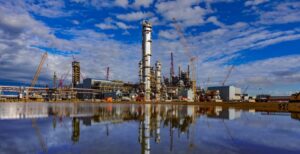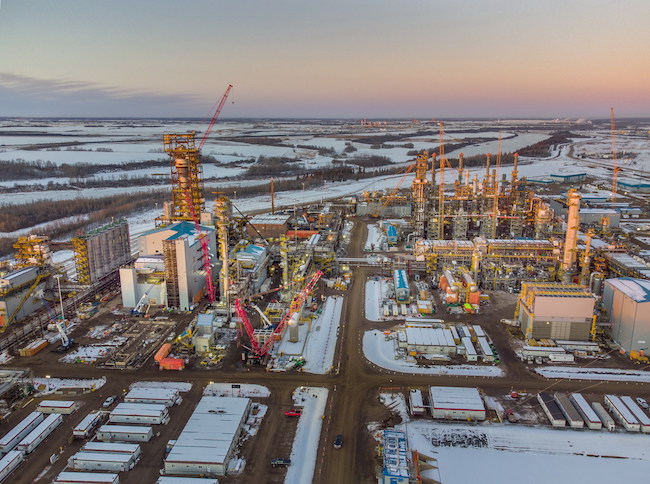Inter Pipeline

Inter Pipeline Ltd.: An In-Depth Overview
Introduction
Inter Pipeline Ltd. is a major player in the energy infrastructure sector in Canada. The company is known for its extensive network of pipelines, storage facilities, and processing plants, which play a critical role in the transportation and processing of hydrocarbons. This report provides a comprehensive analysis of Inter Pipeline, including its history, operations, financial performance, strategic initiatives, and challenges.
History and Development of Inter Pipeline
Inter Pipeline was founded in 1997 and is headquartered in Calgary, Alberta. The company was initially established to focus on the transportation of natural gas liquids (NGLs) and petroleum products. Over the years, Inter Pipeline has expanded its operations through strategic acquisitions and organic growth, becoming one of Canada’s largest energy infrastructure companies.
Key milestones in the company’s history include:
- 1997: Inter Pipeline is founded.
- 2002: Acquisition of the Cold Lake and Corridor pipeline systems.
- 2012: Expansion into the European market with the acquisition of petroleum storage terminals.
- 2019: Completion of the Heartland Petrochemical Complex (HPC).
Operations
Inter Pipeline’s operations are divided into four main segments:
- Oil Sands Transportation
- NGL Processing
- Conventional Oil Pipelines
- Bulk Liquid Storage
Oil Sands Transportation in Inter Pipeline
Inter Pipeline owns and operates three major oil sands pipeline systems: Cold Lake, Polaris, and Corridor. These pipelines transport bitumen and diluent between oil sands production sites in Alberta and refineries in Canada and the United States.
- Cold Lake Pipeline System: One of the largest oil sands pipeline systems in the world, it transports bitumen from production facilities to refineries and export terminals.
- Polaris Pipeline System: Delivers diluent to oil sands producers.
- Corridor Pipeline System: Connects the Athabasca oil sands project to refineries and export terminals.
NGL Processing
Inter Pipeline’s NGL processing operations are centered in Alberta’s natural gas-producing regions. The company processes natural gas to extract NGLs, which are then transported to market. Key facilities include the Cochrane and Redwater NGL extraction plants.
- Cochrane Extraction Plant: One of North America’s largest NGL extraction facilities.
- Redwater Olefinic Fractionator: Processes olefinic NGLs to produce polymer-grade propylene and other by-products.

Conventional Oil Pipelines
The conventional oil pipelines segment involves the transportation of crude oil and NGLs through pipelines that serve conventional oil production regions in Alberta and Saskatchewan. Key assets include the Bow River and Central Alberta pipeline systems.
- Bow River Pipeline System: Transports crude oil from southern Alberta to the Hardisty and Edmonton hubs.
- Central Alberta Pipeline System: Transports crude oil and NGLs within central Alberta.
Bulk Liquid Storage
Inter Pipeline operates a network of bulk liquid storage terminals in Canada and Europe. These terminals provide storage and handling services for petroleum and petrochemical products.
- European Storage Operations: Inter Pipeline’s storage facilities in Europe are located in the UK, Germany, Ireland, and Denmark.
- Canadian Storage Operations: Includes the Edmonton and Hardisty terminals, which provide storage for crude oil and diluent.
Financial Performance
Inter Pipeline has demonstrated strong financial performance over the years, driven by its diversified operations and strategic investments. Key financial metrics include revenue, net income, EBITDA (Earnings Before Interest, Taxes, Depreciation, and Amortization), and capital expenditures.
Revenue and Net Income
Inter Pipeline’s revenue is primarily generated from transportation fees, processing fees, and storage fees. The company has shown consistent revenue growth, supported by long-term contracts with major oil sands producers and other customers.
- 2019 Revenue: CAD 2.6 billion
- 2020 Revenue: CAD 2.4 billion (impacted by the COVID-19 pandemic)
- 2021 Revenue: CAD 2.9 billion (recovery from pandemic-related disruptions)
Net income has also been strong, with the company maintaining profitability despite market volatility.
- 2019 Net Income: CAD 538 million
- 2020 Net Income: CAD 376 million
- 2021 Net Income: CAD 555 million
EBITDA and Capital Expenditures
EBITDA is a key measure of Inter Pipeline’s operational performance and cash flow generation. The company’s EBITDA has been robust, reflecting the stability of its core businesses.
- 2019 EBITDA: CAD 1.4 billion
- 2020 EBITDA: CAD 1.2 billion
- 2021 EBITDA: CAD 1.5 billion
Capital expenditures are significant, given the company’s focus on expanding and maintaining its infrastructure. Major investments include the Heartland Petrochemical Complex and pipeline expansions.
- 2019 Capital Expenditures: CAD 1.3 billion
- 2020 Capital Expenditures: CAD 1.1 billion
- 2021 Capital Expenditures: CAD 1.4 billion
Strategic Initiatives
Inter Pipeline has undertaken several strategic initiatives to enhance its competitive position and drive long-term growth. These initiatives include expanding its asset base, diversifying its revenue streams, and pursuing sustainability goals.
Expansion Projects
Inter Pipeline continues to invest in expansion projects to increase its capacity and market reach. Key projects include:
- Heartland Petrochemical Complex (HPC): A CAD 4 billion project that includes a propane dehydrogenation plant and a polypropylene plant. The HPC is designed to convert propane into polypropylene, a valuable plastic used in various applications.
- Pipeline Expansions: Ongoing expansions of the Cold Lake and Polaris pipeline systems to accommodate growing production from oil sands producers.
Diversification
Inter Pipeline is diversifying its revenue streams by entering new markets and expanding its service offerings. The company’s bulk liquid storage operations in Europe and its foray into the petrochemical sector through the HPC are examples of this strategy.
Sustainability
Sustainability is a key focus for Inter Pipeline. The company is committed to reducing its environmental footprint and supporting the transition to a lower-carbon economy. Initiatives include:
- Carbon Capture and Storage (CCS): Exploring opportunities to implement CCS technology at its facilities.
- Renewable Energy: Investing in renewable energy projects to offset its carbon emissions.
- Environmental, Social, and Governance (ESG) Reporting: Enhancing transparency and accountability through comprehensive ESG reporting.
Challenges
Despite its successes, Inter Pipeline faces several challenges that could impact its operations and financial performance. These challenges include:
Regulatory and Environmental Risks
The energy infrastructure sector is subject to stringent regulatory and environmental standards. Inter Pipeline must comply with regulations related to pipeline safety, emissions, and environmental protection. Non-compliance or changes in regulations could result in increased costs and operational disruptions.
Market Volatility
The company’s financial performance is influenced by commodity prices, demand for hydrocarbons, and economic conditions. Market volatility, such as fluctuations in oil and gas prices, can impact revenue and profitability.
Competition
Inter Pipeline faces competition from other pipeline operators and energy infrastructure companies. Maintaining a competitive edge requires continuous investment in infrastructure, technology, and customer relationships.
Operational Risks
Operational risks, including equipment failures, accidents, and natural disasters, can affect the company’s ability to transport and process hydrocarbons. Inter Pipeline must implement robust risk management and contingency planning measures to mitigate these risks.
Conclusion
Inter Pipeline Ltd. is a leading energy infrastructure company with a diverse portfolio of assets and a strong track record of financial performance. The company’s strategic initiatives, including expansion projects, diversification, and sustainability efforts, position it well for future growth. However, Inter Pipeline must navigate regulatory, market, and operational challenges to maintain its competitive position and achieve its long-term objectives.
By focusing on innovation, operational excellence, and environmental stewardship, Inter Pipeline can continue to play a vital role in Canada’s energy sector and contribute to the global transition to a more sustainable energy future.
In case, if you need help with Work Visa and Immigration Services in Canada, please fill in application below or contact us directly.

